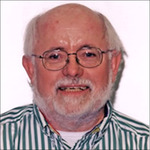Remembering Dr. James (Jim) Riley

We at the WRRC were saddened to learn that our friend and colleague, Dr. James (Jim) Riley, emeritus professor in Environmental Sciences at the University of Arizona, passed away on December 7, 2023. Dr. Riley retired from the UArizona in 2013 following a long career focused on water in arid environments. After earning his PhD in Hydrology from the University of Arizona in 1968, he served as Assistant Director of the Arizona WRRC for a year before taking on the administration of international agricultural research and development programs outside the United States. He returned to UArizona in the 1990s, focusing on research and teaching. Perhaps best remembered for his work in water harvesting, Jim Riley was a founder and central figure in the volunteer consulting and advocacy organization, CATCHWater (Consortium for Action Throughout the Community for Harvesting Water), promoting water harvesting in the Tucson region.
Later, responding to prompting from UArizona students, Riley created the university’s first water harvesting course, which has been offered continuously since the Spring of 2006. The course led to the implementation of a student-driven water harvesting project on campus that was a model of collaboration between students, faculty, and staff at the university. One of his students, Richard Rushforth (now an assistant research professor at NAU) wrote, “Dr. Riley was an amazing human being. A thoughtful advisor to students and fierce advocate on their behalf, he advised a variety of student groups, including water conservation and sustainability groups, and he encouraged students to drive projects from design through completion. These projects helped institutionalize rainwater harvesting on campus and across Tucson.” A close colleague, Grant McCormick, summed up Jim Riley’s impact on water management this way: “Jim’s career-long commitment, combined with his support and inspiration of generations of students, his ability to collaborate broadly within the university and Tucson communities, his support of both institutional and grass-roots efforts, and the timely water harvesting research he conducted, all contribute to his lasting legacy.”

